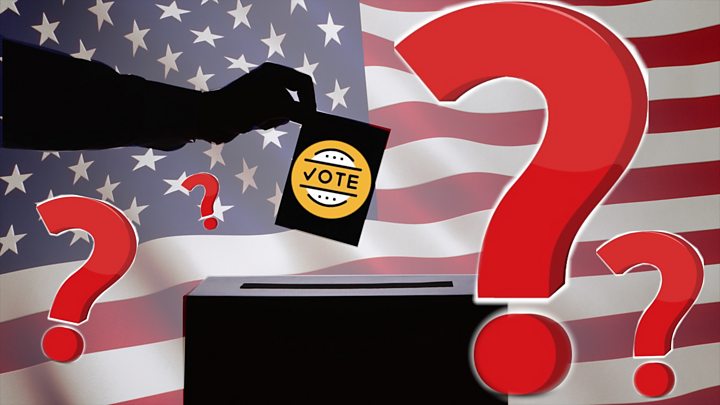Is this Donald Trump’s best month yet?
These days there seems to be even more of a swagger as Donald Trump strides across the South Lawn to board his green-liveried helicopter, Marine One.
Those campaign-style rallies, which have become such a marked feature of his presidency, have even more of a celebratory charge.
The president seems more willing to answer reporters’ questions, partly because there is a better story to tell.
Last week he also sat for the first 60 Minutes interview of his presidency, which aired on Sunday night.
The veteran CBS presenter Lesley Stahl, who conducted this cross-examination, was struck by his self-assurance. “Right now,” she said afterwards, “he’s so much more confident. He is truly president. And you felt it. I felt it in this interview.”
His latest Gallup approval rating is also up to 44%, a net rise of 11 points over the past month.
That is higher than Bill Clinton (41%) at a similar point in his presidency and also Ronald Reagan (42%). It is on a par with Barack Obama, who was at 46%.
All of them were two-term presidents.
October has been the most successful month of the Trump presidency so far.
It started with a new trade deal with Canada and Mexico superseding the Nafta trade deal. Unemployment has reached a 49-year low.
The White House is taking credit for the release of Pastor Andrew Brunson, an American evangelical imprisoned in Turkey for two years, who knelt to pray with Donald Trump at the Oval Office over the weekend.
Soon the president will add his felt tip signature to new legislation tackling the opioid crisis, the product of rare bipartisanship between Republicans and Democrats.
His crowning achievement, though, was getting his second nominee onto the Supreme Court, giving America’s highest court a decisive conservative majority for the first time in decades.
That alone instantly gives Donald Trump a legacy. Come 2050, Neil Gorsuch and Brett Kavanaugh could still be on the court, maybe sitting alongside other Trump appointees.
Improbable as it once might have seemed, a thrice-married former playboy has made the federal judiciary more socially conservative.
It is also worth reflecting on what the president hasn’t done this month: sacked Rod Rosenstein, the senior Justice Department official who oversees Robert Mueller’s Russian collusion probe.
Had he fired his deputy attorney general, we could have been in the midst of a full-blown constitutional crisis, with historical echoes of Richard Nixon’s Saturday Night Massacre in October 1973.
Here, though, the president demonstrated restraint.
Robert Mueller’s investigation has also been quiet this month, maybe because his team hasn’t compiled enough evidence to add to its 32 individual indictments, or more likely because it has wanted to avoid accusations of meddling in the mid-term congressional elections.
The “witch hunt” presidential Twitter tirades for now have trailed off a little.
The White House also managed to contain the fall-out from this month’s one high-level departure, that of the UN ambassador Nikki Haley.
Their cheery joint appearance in the Oval Office made it look like an amicable separation. No one has yet come forward, or briefed the New York Times, the Washington Post or the website Axios with printable information to suggest otherwise.
On the personal front, but one which impacts his presidency, Stormy Daniels’ defamation lawsuit against Mr Trump has been dismissed by a federal judge in Los Angeles – a ruling which the president’s lawyer described as a “total victory”.
It has hardly been a month of absolute success. There’s been no shortage of Trumpian unorthodoxy.
Brett Kavanaugh’s White House swearing-in ceremony, which was constitutionally superfluous, took on the character of a partisan pep rally, an overtly politicised event.
Kanye West’s diatribe in the Oval Office was so bizarre that Saturday Night Live’s parody seemed less wacky than the original.
There’s also been no shortage of Trumpian inconsistency and insensitivity. Within the space of a few days, Brett Kavanaugh’s accuser Christine Blasey Ford went from being a “compelling” witness to being the target of the president’s mockery.
“The Mississippi speech”, as it has been labelled, in which he derided the Californian professor, might end up being as defining for women as his Charlottesville remarks were for African-American and Jewish voters.
The Khashoggi disappearance and possible homicide has also illustrated how the doctrine of patriotism outlined by Donald Trump at the United Nations last month could have been construed by authoritarian leaders as a doctrine of anything goes.
His comments casting doubt on the science of climate change have also alarmed, though not surprised, many in the international community, who have traditionally looked to America for global leadership.
Donald Trump, who claimed during his Mississippi speech that “the only reason to vote Democrat is if you are tired of winning”, most likely sees these as successes rather than setbacks.
The Kavanaugh victory party demonstrated how much the Republican Party has rallied around his presidency – there was only one Republican defection in the run-up to the final vote, after all.
Kanye West’s flattery showed he has the worshipful backing of one of America’s biggest black celebrities.
As for the Mississippi speech, he would probably view it not as a denigration of Christine Blasey Ford, or women more broadly, but as an important declaration in support of men, like him, whom he would claim have been falsely accused.
October is a month when America has come to bear more of the president’s personal branding. There’s more talk of a “Trump economy”, a “Trump Supreme Court”, a “Trump GOP”.
Even this new season of American football bears his mark, as the “Take the knee” protest has petered out.
Certainly, the president is delivering on core promises made during his campaign: on trade, on the travel ban, on lowering taxes, on elevating social conservatives to the federal bench, on crippling the group calling itself Islamic State (IS), on moving the US embassy in Israel from Tel Aviv, on conducting a very different kind of presidency, unrestrained by historical norms.
Even many Republican voters who tell you they blanch at his behaviour often commend him for being that rare thing, a politician who keeps his promises.
The presidency his opponents feared is precisely the presidency his most ardent supporters longed for.
Donald Trump remains the only post-war president not to crack the all-important 50% threshold in the Gallup poll, which speaks of how he continues to polarise the country.
Given the strength of the economy, he should be far more popular.
The upcoming mid-term congressional elections are likely to underscore this Two Americas narrative.
The Republicans are poised to retain their narrow majority in the Senate, aided by what’s being called the Brett Bounce, which has energised the conservative base in red states. The Democrats are poised to win back control of the House, partly because of a backlash from suburban female voters.
This may have been a good month from a White House point of view, but America remains just as divided as ever, with Donald Trump the polariser-in-chief.
Source: Read Full Article





